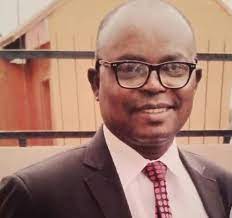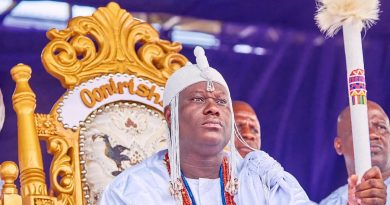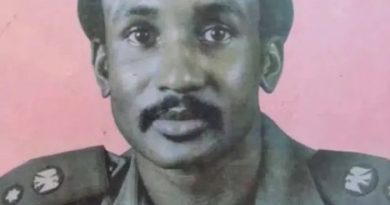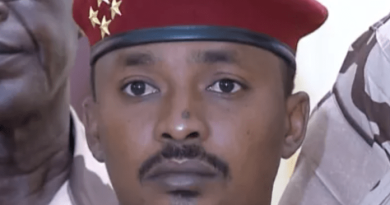When Nigerians Lose Interest In Democracy, What Next?
By Bola BOLAWOLE
turnpot@gmail.com 0807 552 5533
For forms of government, let fools contest. Whatever is best administered is best – Alexander Pope
Those who make peaceful revolution impossible will make violent revolution inevitable – US President John F. Kennedy
Let me start by saying that a good number of Nigerians have lost faith in the ballot box; it only remains for them to also lose interest completely in the democratic process as a whole. If and when they do, what next?
Of course, democracy is not the only form of government available. There are options.
Alexander Pope (Born: 21 May, 1688; Died: 30 May, 1744) was an English poet, translator and satirist of the Enlightenment era who is considered as one of the most prominent English poets of the early 18th century. He was best known for his poems: An essay on criticism (1711); The rape of the lock (1712 – 1714), The Dunciad (1728) and Essays on Man (1733 – 1734). The opening quote above, which is taken from Pope’s “Essays on Man”, implies that it makes no difference if a nation or people are governed as a republic or monarchy or some other forms of government; what matters is whether the government attains good results.
Now, what are “good results”? Jeremy Bentham (1748 – 1832), who is regarded as the father of Utilitarianism, argues that actions should be judged to be either right or wrong to the extent that they increase or decrease human well-being or ‘utility’.
Thus, the three principles of Utilitarianism are: pleasure or happiness is the only thing that has intrinsic value; actions are right if they promote happiness, and wrong if they promote unhappiness; and everyone’s happiness counts equally.
So, to determine right from wrong, Utilitarianism focuses on outcomes; it is a form of consequentialism that holds that the most ethical choice is the one that produces the greatest good for the greatest number.
If we put the Fourth Republic, which began to run on May 29, 1999, on the utilitarian scale, what would the outcome be? Nineteen-ninety-nine to date has been the single longest stretch of, well, democratic experiment, that we have had in this country but has it translated into the delivery unto the people of the so-called dividends of democracy? What is the worth of a democracy that decreases, instead of increasing, the happiness and well-being of the citizenry?
Let us ask the following hypothetical questions: Assuming that in 1999, rather than hand over power to a civilian administration, the military have continued in office, would we have witnessed the level of corruption that we saw under Olusegun Obasanjo and Umaru Yar’Adua (especially after he became incapacitated by ill-health and the cabals, led by his wife, Turai, took over)? What of the humongous corruption under Goodluck Jonathan and the ‘Oga patapata’ of them all, Muhammadu Buhari?
Assuming that the military were still in power, would we have seen the level of insecurity that this country witnessed under Obasanjo, Yar’Adua, Jonathan and Buhari?
Would Boko Haram have run riot the way it has done? Would Fulani herdsmen have transmuted to the monstrous killers that they became? Would a military government have allowed bandits to hold this country by the jugular like we have witnessed?
Since 1999, the security of life and property has worsened, one administration after another. Would that have been the case under a military administration?
Oil theft and oil bunkering virtually crippled the economy of this country, especially during Buhari’s tenure; would that have been the case under a military regime? Industries keep collapsing by the hour, many of them relocating from the country; unemployment is at an all-time high; crime wave has hit the roof; youth restiveness and “japa” syndrome has sapped the country of its energy. Cultism and rituals, cybercrime and sundry crimes are the “industries” left for our youths.
The economy totters on the verge of collapse. Would this have been the case under a military regime? With the national minimum wage at N30,000, two workers at that level have to combine efforts to buy a bag of rice!
The Naira has been so mindlessly devalued that many are afraid we may be on the road to Zimbabwe. Infrastructure is decrepit all over the place. No water. No electricity. Yet tariffs keep skyrocketing. No roads. What pretends to be is a death trap. Travelling on them is made more hellish by the activities of kidnappers and criminals of different hues.
Which better approximates today’s Nigeria: Dante’s Inferno or Hell, “a funnel or inverted cone descending in nine diminishing rings until the centre of the earth” or Thomas Hobbes’ state of nature “where there is no agreed way to enforce collective or individual well-being and protection” leading to a war of all against all and life, therefore, becomes “solitary, poor, nasty, brutish and short?”
There is rot everywhere. In our institutions at all levels. In the hospitals. In the civil service. In the judiciary. In the churches and mosques. In the palaces of our traditional rulers. In homes. Everywhere! Even in the military itself!
Karl Maier ain’t seen anything yet, as they say, when he wrote “This house has fallen: Nigeria in crisis” in 2000. We are right now in the eye of the storm! But would the situation have been the same – or worse – if the military hadn’t passed the baton to the civilians in 1999? When going forward is difficult, looking back becomes attractive.
Our politicians have learnt nothing and forgotten nothing. The present crop of politicians seemeth to me worse than anyone we have had in history. They are audacious and rapacious. They are contemptuous of the people. Their impunity rankles. It is like they owe the people nothing but the people owe them everything!
They carry on as if someone has assured them there will be no consequence, and no retribution, for their actions, no matter how banal, no matter how audacious.
Were the military that we complained about as audacious and rapacious as the politicians that we replaced them with? The politicians slap us on the face and shove their shenanigans down our throats.
Surprisingly, we have been quiet despite the monstrosity of their crimes. Is that not what has further emboldened them to pile more misery on us? We stomach it all. And the more we stomach, the more they unleash! When shall we pass the elasticity point?
In a democracy properly so-called, periodic elections offer the opportunity to offload bad leaders and elect replacements. No more! The vote is the power of the electorate. No more! The ballot box is the coffin of bad leaders.
No more! Democracy has been turned upside down here. It is now, to all intents and purposes, demons-go-crazy. It is bad enough when demons bear rule; it is worse when those demons go crazy. That is what we have witnessed in the last eight years in Kogi and Imo, for instance, and in many other parts of the country.
In Ondo state, an invalid sits tight in office and rules from “abroad” Everywhere is quiet.
What kind of people are we? The law is held captive. The cabals, just a handful of people around His Excellency, are having a field day with the resources of a state of 5.3 million people. Yet, this was the same man who, as president of the Nigerian Bar Association, was quick, on 4 December, 2009, to berate the then sickly President Umaru Yar’Adua, asking him to resign immediately!
So, Mr. Governor knew how to serve another man hemlock. Now that it is his turn to drink from the same cup, he has developed cold feet! This, certainly, is not the attribute of a great leader. Tell me, Aketi, what do you want to be remembered for? Next time you are digging a pit for another man, make sure it is not too deep!
But what is it that we eat that won’t get exhausted one day, except God’s grace? Governor today, ex-governor tomorrow; whether they like it or not! That is the import of the evergreen message of Nnamdi Azikiwe to the then East Central State Administrator, Ukpabi Azika: No condition is permanent!
Is it too late already for the politicians of the Fourth Republic to retrace their footsteps? If yes, their good grief! If not, time is not on their side. Last weekend’s elections in Kogi, Imo and Bayelsa states made a bad case worse for them.
At least one positive of the President Bola Ahmed Tinubu administration is that in the past few months, the Federal, State and Local governments have received more money from the Federation Account than they have ever done but the dividends have not trickled down to the grassroots. Why? Where is all the money going?A people not allowed to freely elect their leaders can neither be expected to accord legitimacy to the leadership so thrown up nor support and defend the system as a whole. There is nothing sacrosanct about any system or form of government.
The bottom line is “whatever is best administered” (Alexander Pope) to ensure “the greatest happiness of the greatest number” (Jeremy Bentham).Mark my words: Nigerians are at the breaking point and need a change for the better. If our politicians keep standing in the way of peaceful revolution, they will make violent revolution inevitable (JF Kennedy). You will say I said so!
Former Editor of PUNCH newspapers, Chairman of its Editorial Board and Deputy Editor-in-chief, BOLAWOLE was also the Managing Director/ Editor-in-chief of THE WESTERNER newsmagazine. He writes the ON THE LORD’S DAY column in the Sunday Tribune and TREASURES column in New Telegraph newspaper on Wednesdays. He is also a public affairs analyst on radio and television.




